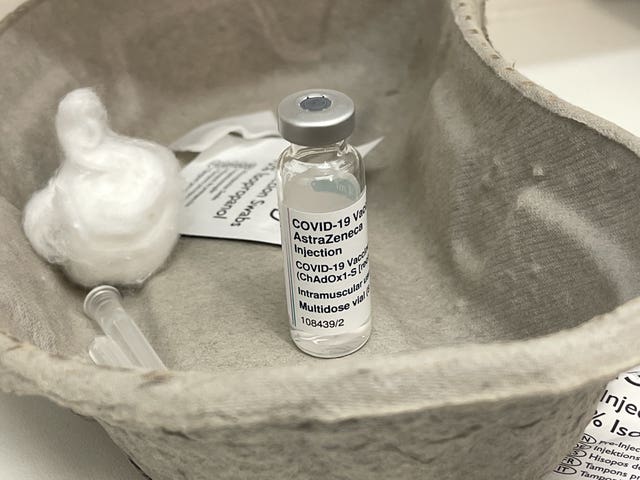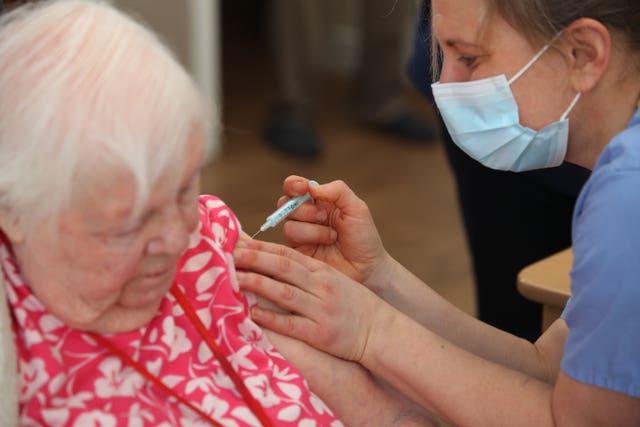Should I be worried about the AstraZeneca Covid-19 vaccine?
Regulators gave updates on their investigations into whether the Oxford/AstraZeneca vaccine is linked to rare blood clots.

The UK medicines regulator has said benefits of the Oxford/AstraZeneca vaccine continue to outweigh any risks, but added that under-30s will be offered an alternative jab.
Meanwhile, in a separate update on its investigations on Wednesday, the European medicines watchdog has ruled that unusual blood clots were “very rare side effects” of the jab.
Some European countries have restricted the vaccine’s use in younger people following reports of cerebral venous sinus thrombosis (CVST), a specific type of clot that prevents blood from draining from the brain, as well as low platelet counts – cells that help blood clot.
Prime Minister Boris Johnson has said people should follow the regulator’s advice and keep getting their jabs.
– What have the regulators said?
A review by the European Medicines Agency (EMA) safety committee concluded on Wednesday that “unusual blood clots with low blood platelets should be listed as very rare side effects” of the AstraZeneca vaccine.
Emer Cooke, executive director of the EMA, said: “These are very rare side effects.
“The risk of mortality from Covid is much greater than risk of mortality from these side effects.”
The MHRA said there were still huge benefits of the vaccine in preventing Covid-19 and serious disease but added that due to a very small number of blood clots in younger people, those under the age of 30 will be offered Pfizer or Moderna jabs instead.
Dr June Raine, MHRA chief executive, added: “Anyone who has symptoms four days after vaccination or more should seek prompt medical advice – a new onset of a severe or persistent headache or blurred vision, shortness of breath, chest pain, leg swelling, persistent abdominal pain or indeed unusual skin bruising or pin-point spots beyond the injection site.”
– How many people have been affected?

Up to March 31, the MHRA has received 79 reports of blood clots accompanied by low blood platelet count, all in people who had their first dose of the vaccine.
Of these 79, a total of 19 people have died, although it has not been established what the cause was in every case.
The 79 cases occurred in 51 women and 28 men, aged from 18 to 79.
Of the 19 who died, three were under the age of 30, the MHRA said. Some 14 of those cases were CVST while the other five were thrombosis.
Meanwhile, in Europe, the EMA has carried out an in-depth review of 62 cases of CVST and 24 cases of splanchnic vein thrombosis in which 18 people died.
– How have other countries reacted?
Germany, France, the Netherlands, Sweden and Canada have restricted the use of the AstraZeneca vaccine in younger people while Denmark and Norway have paused administering it.
– What has AstraZeneca said?
Last month, AstraZeneca said it was analysing its database to understand “whether these very rare cases of blood clots associated with thrombocytopenia (low blood platelet count) occur any more commonly than would be expected naturally in a population of millions of people”.
Meanwhile on Tuesday, a trial of the Oxford/AstraZeneca vaccine on children was paused, but the scientists involved said there were no safety concerns with the trial itself and they were waiting for further information from the MHRA.
– What are the experts saying?

Scientists in the UK have said urgent research is needed to understand more about the risk of these rare blood clots.
David Werring, professor of clinical neurology at the UCL Institute of Neurology, said: “The EMA and MHRA statements are helpful in providing further clarity about the very rare blood clots with low blood platelet counts – mainly in the brain (cerebral venous sinus thrombosis) but also in other parts of the body – that have occurred after the AstraZeneca vaccine.
“Both the EMA and MHRA emphasise that the overall benefit of the vaccine in preventing illness, hospitalisation and death from Covid-19 clearly outweighs the risks of this rare potential complication; thus, vaccination programmes should continue as planned.
“We still urgently need more research to first understand which individuals are at highest risk of these unusual blood clots in the brain, which although very rare, can often be serious or fatal.”
Dr Michael Head, senior research fellow in Global Health, University of Southampton, said that while the link is not proven, it is now thought to be increasingly plausible.
He said: “We have seen an update from the UK and EU regulators, suggesting that these thrombotic events may have been a causal, but rare, adverse event from the Oxford AstraZeneca vaccine.”
He added: “It’s important to emphasise that adverse events happen with all medicines, and vaccines are no exceptions.
“Safety surveillance is vital in picking up and assessing signals that emerge from the data.”
– What other vaccines are available?
The UK is currently using two vaccines, Pfizer/BioNTech and Oxford/AstraZeneca, while a third coronavirus vaccine, the Moderna jab, began its rollout in Wales on Wednesday.
Meanwhile, preliminary results announced on Tuesday from the trials of the Valneva Covid-19 vaccine, which is set to be manufactured in the UK, have shown it produces a “strong immune response”, paving the way for a phase three clinical trial.
The UK has an in-principle agreement for 60 million doses of the Valneva jab, with an option to acquire a further 130 million doses from 2022-2025.
The country has also ordered 30 million doses of a coronavirus vaccine developed by Johnson & Johnson, which has been shown to be 66% effective in preventing coronavirus infection.
Both the Valneva and Johnson & Johnson jabs will need regulatory approval for use in the UK, once data from later-stage trials become available.
– What has been said about the Pfizer/BioNTech or Moderna jabs?
The MHRA has said up to March 31, it had received “two reports of blood clots (thromboembolism) reported with thrombocytopenia for the Pfizer/BioNTech vaccine”.
By this date, approximately 11 million first doses and 3.5 million second doses of the vaccine had been given, the MHRA said.
There is no data on the Moderna vaccine as it is not yet being used widely in the UK.




